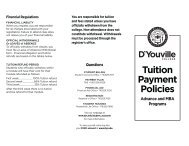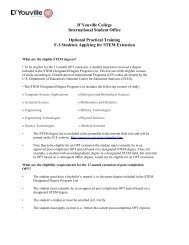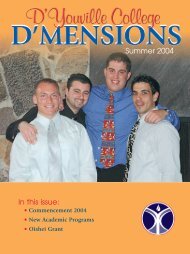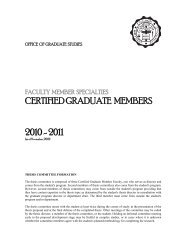D'Mensions Spring 2005.indd - D'Youville College
D'Mensions Spring 2005.indd - D'Youville College
D'Mensions Spring 2005.indd - D'Youville College
Create successful ePaper yourself
Turn your PDF publications into a flip-book with our unique Google optimized e-Paper software.
TWO D’YOUVILLE EXPERTS SPEAK OUT ONTHE COMPLEXITIES OF GLOBAL AND CROSS-BORDER TRADE ISSUES FACING US TODAY.Kushnood Haq, Ph.D.,asks“Where do we go from here?”THE FUTURE OFINTERNATIONALBUSINESSKushnood Haq, Ph.D.Assistant Vice President forAcademic AffairsEducation:Canisius <strong>College</strong>, B.S.,Business ManagementSt. Bonaventure University, M.B.A.,Accounting FinanceUniversity at Buffalo, Ph.D.,International TradeProfessional Experience:Emrum International Company,PresidentBuffalo Recycling Group,President/General PartnerM & T Bank,Corporate Compliance OfficerMarine Midland Bank,Operations/Credit ManagerProfessional Affiliations:Ken-Ton Chamber of CommerceNiagara Region International TradeCouncilFederal Economic CommunityDevelopment BoardConnecticut Street BusinessAssociationBuffalo-Niagara Region Council forInternational VisitorsBuffalo World Trade AssociationStudents in Free Enterprise (SIFE)Association of American Geographersn the post-9/11 world, identifying benefitsof international business has been a daunting task for educators, policy makers, and promoters of freetrade. Wars in Afghanistan and Iraq, unremitting violence between Israel and Palestine, potentialconflicts with Iran and North Korea, and religious and ethnic troubles in other parts of Asia and Africahave contributed to an uncertain environment in many consumer and commercial markets aroundthe world. On the economic side, ballooning U.S. budget and trade deficits and the subsequentdevaluation of the U.S. dollar, stagnant economies and high unemployment in many Europeancountries, and looming uncertainties in major stock markets have exacerbated the problem. To top itall, the most recent round of global trade talks in Doha, Qatar, has failed to produce tangible resultsto date. On the surface, it may appear that the process of globalization has stalled, and the days ofvanishing tariffs, global integration and cooperation, and the free flow of investments may once againbe replaced by the old version of bilateral treaties.Still, there are many reasons to be optimistic about what the future holds for international business.Despite some rocky roads, most countries, including the United States, have been willing to stay ontrack in their efforts toward globalization, realizing that they can not afford to go back to old ways.Moreover, rapid growth in Chinese, Indian, and other consumer and commercial markets in Asia arecreating new and exciting opportunities for U.S. firms.U.S. policymakers and business executives must address three areas in order to take advantage ofthese conditions, and as a result, successfully promote an international business model that in the longterm is equitable, fair, and mutually beneficial to all nations.First, as the economic leader of the world, America must work on getting its own economic housein order. This goal can largely be accomplished through reduction in federal spending. Furthermore,the high growth rate of our economy and our willingness to tackle the difficult issues of retirement,health care, and education should also help. These measures will strengthen the economy and restoreforeign investors’ confidence, resulting in increased flow of investments that are mainly responsible forfinancing our federal deficit. On the trade side, controlling trade deficits by advocating internationaltrade in areas where U.S. industries hold competitive advantage should be a priority. While givingaccess to other countries to our insatiable appetite for foreign products, our government must alsoinsist on gaining further access to potentially lucrative markets like China, Japan, India, and Brazil,especially in high technology and information-based areas where U.S. companies hold advantage overforeign producers.Second, the United States should continue to lead efforts toward a global trade framework thatpaves the way to trade liberalization. At the same time, bilateral treaties that can create a furthereconomic wedge among regions and countries should be avoided. History suggests that leadershipprovided by the United States has been critical to every global trade round since the inception ofa multilateral trade system following World War II. While working on trade liberalization, theUnited States should also insist on a level playing field for all of the trading partners and advocateresolutions for issues of labor practices, intellectual property protection, and technology transfer. Itis also important not to give in to domestic constituents who want to regulate free trade throughquotas and subsidies in textile, steel, and other vulnerable industries. Instead, U.S. policymakers18
















